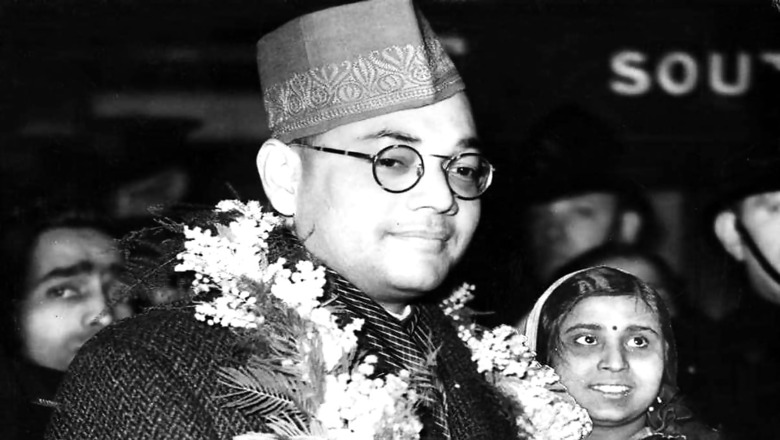
views
History is a war of facts and their presentation in a manner that would suit the parties engaged in the war. No two men can view reality alike. And, therefore, no two men will be able to have the same perspective of the past and its impact on the present. In a war, one cannot, as an arché, offer mindless concessions to the other side to the latter’s advantage over the former.
History will always stand on the interests of the parties involved. It will remain split and that side of it will dominate. Having said that, it is the legitimate prerogative of the natives of a nation to recount their own credible and viable versions of the past events of the land without requiring any need to resort to certain universal standards which are the results of the legacy of Western imperialism and whose sole objective is concealment of the West’s sinful records in the country by creation and reification of a grand, mythical narrative of itself.
In a long-standing situation of the dominance of the academia, mainstream media and judiciary by a set of natives who have kowtowed to the interests of the colonisers to serve their own diverse ends, the natives in whom the effect of colonisation has started to wear off have a moral imperative to confront and resist these internal adversaries and their dupes who thus deny genuine history out of sheer political motives. And more so when there is a wealth of evidence and corroborative documentation supporting the indigenous account and awaiting discernment, a retreat on any spurious and flippant ground will only add to the cumulative sin of cowardice.
The history related to the lifetime and death of Netaji Subhas Chandra Bose requires liberation from the relentlessly sinister subversion by the so-called established academia and media. Netaji himself was an icon of powerful indigenous resistance to the White supremacism of the Britishers. So inordinately frustrated had the British been by Netaji’s insurrectionary activities that Winston Churchill desperately wanted to finish him off.
Orders to assassinate him had been issued to the Special Operations Executive (SOE) sometime in March 1941 and were never withdrawn. The elite apostles of non-violence who eschewed armed revolt against the British in the independence movement were never a bother to Churchill. Besides, in the entire course of his independence struggle, Netaji was imprisoned eleven times. Between 1921 and 1945, he enjoyed just eleven years of freedom, suffered imprisonment in Bharat for six years and was in exile for seven years. He was verily the most formidable foe of the imperial power—British’s Enemy No. 1. He was a man who would trash the fanciful hypothesis of acquiring independence or a semblance of it (as the moderates of the Congress could bring themselves to wish for) through peaceful discussions with the imperialists. He had mocked the Round Table Conferences.
The behaviour pattern of the moderates had always irked him. He saw no utility in the policy of Mohandas Karamchand Gandhi and made no bones of his disagreement. Soon after his return from England in 1921, he had a dust-up with “the naked faqir” in Mumbai’s Mani Bhawan. The young man had the gumption to tell Gandhi point-blank to the effect that the latter’s plan to make Bharat free lacked details, intent and feasibility. Netaji was of the conviction that the only course to free his motherland from the foreign yoke was war.
It was Netaji’s adhyatmikta bent of mind that propelled him to take part in the struggle for Bharat’s independence. However, if interpreting Netaji is limited to a solely revolutionary perspective or if he is entirely being looked upon from a frame of Western left-wing, centric or right-wing politics, we will again allow some aberrations to impact our examination of his politics, the shinning role he played in the then Bharatiya politics and all the events of his life that followed his disappearance in August 1945.
Some obvious parallels between the early lives of Netaji and Swami Vivekananda need to be considered for cognisance of Netaji’s inclination towards sadhana and adhyatmikta and so do the influences of Ramakrishna Paramahansa and Sri Aurobindo upon his growing mind in the early part of his life. His writings reflect adhyatmika and a simultaneous hunger for its enhancement that kept on swelling as his life progressed. He also devoutly undertook Tantra Sadhana, (a feature that figured prominently in his secret life post his 1945 disappearance). He got initiated into Kriyayoga by one Babu Barada Charan Majumdar immediately following information that he had received about his illness at the 1939 Tripuri session having been caused by some Tantrika phenomenon.
The discipline of Tantra Sadhana drew his ever-inquisitive mind even as a youth and during the period of his incarceration from 1924 to 1927, he plunged into the works of Shivachandra Vidyarnava and John Woodroffe (Arthur Avalon). Undoubtedly, his Adhyatmika pursuits and the enlightenment that followed surely exerted a profound influence on his political as well as social thinking. In truth, his Adhyatmikta endowed him with the inner strength to endure a fate riddled with unspeakable trials and tribulations for the sake of Bharatavarsha which to him had always been his ‘Janani Janmabhoomi’, non-different from Durga and Kali.
The issues of his fate, known political life and legacy after death, especially in Bengal have thus all become interwoven in the light of his multilayered persona eventually leading to bitter political turf wars amongst rival political outfits. The blame for the illegitimate appropriation of his legacy is usually hurled by the opponents of the Sangh Parivar with the Sangh at its receiving end. In doing so, the attacking political parties, viz., the Congress and the Left Front, brazenly make attempts to sweep all their offences against Netaji under the rug.
Nonetheless, for their innocuousness towards Netaji and their authentic appreciation of Netaji’s sacrifice, the Saffron camp remains the only ray of hope in this encircling gloom. The article, therefore, intends to put in one canvas all the complex phenomena that revolve around Netaji Subhas Chandra Bose and underscores the significance of a sturdy and steady political will on the part of the Hindutva brigade for the resurgence of Netaji’s legacy premised on corrected history in the Bengali psyche.
There is a general apathy amongst the majority of Bengalis towards the issue of Netaji’s fate. Many among them firmly endorse the air crash theory. They back the official version and straightaway reject alternative theories that suggest his disappearance in 1945. Their perspective has emerged gradually since the time a big faction of the Bengali elites ran hostile campaigns against Netaji in order to curb his political influence in his home state. The old allegations that he played into the hands of Nazis for the elevation of his political stature while disregardful of the nation’s sovereignty that could have been compromised had the Axis Powers won the war have prevailed.
Since the issue has been raked up mostly by people associated with the Sangh Parivar in a way that turns the spotlight on alternative theories, the matter of Netaji’s fate has become a BJP narrative or something that negationists who in truth are crass disparagers would like to describe as an aspect of Hindutva (nationalist) movement. And there is enough truth in this phenomenon.
But this author would like to put it, unlike the disparagers from a diametrically opposite viewpoint, having taken a cue from the findings of and analyses made by Anuj Dhar and Chandrachur Ghose, who have devoted their lives to revising the established narratives surrounding Netaji’s death. Worth mentioning here is this marvellous piece of fact that the disparagers do not run out of their fluid spirit in directing their hate-driven campaigns against Netaji and the duo of Dhar and Ghose despite the duo’s repeated point-by-point rebuttals of all their bogus allegations.
The issue concerning Netaji’s fate could not have been discussed in a factual and objective manner by any political party that has an indelible history of inflicting the most grievous injuries on the issue itself and on Netaji’s political career during his lifetime till 1945. Ergo, it always had to be certain groups of people who would be favourably disposed towards him to the extent that they genuinely adore him regardless of their differences with Netaji in political ideologies and stances. The Netaji issue by default had to be picked up and owned by individuals spearheading the Hindutva movement or at least having a strong antipathy to the politics of Congress and leftism at large or, Islamic or Christian imperialism.
A key facet of the project of solving the Netaji mystery undertaken by Anuj Dhar and Chandrachur Ghose is that the findings they have been led to by way of their scientifically rigorous treatment of all relevant details, admittedly, are predicated fairly on rectified accounts of the roles played by Netaji and his Indian National Army (INA) in Bharat’s freedom struggle besides a holistically reappraised life history of this legendary nationalist leader who is hailed by many as the chief architect of Bharat’s independence. Motivated distortions in the accounts of the known life and work of Netaji that have been accommodated in the annals of history must be repaired, especially, under the impact of new findings and critical reassessments of known facts.
For instance, Netaji’s priority of the country’s independence over the crimes of the Nazis (put as though the Churchills and the Mountbattens were doves leading a cathartic struggle against the worldwide colonies of Germany—a possibility only in an alternate reality) is often likened to the alleged indifference of Hindutvavadis towards the alleged “massacre of Muslims in the country”. In one or the other way, the Netaji mystery gets linked to the Hindutva movement and some fake narratives or phoney red herrings obliterate all facts that have been scientifically established by the seminal research of Anuj Da and Chandrachur Da. These facts premised on legitimate documents (viz., official papers, government files and letters) and scientific analyses as a whole then become a part of the “BJP narrative”. In case, someday the Congress or any other anti-Hindutva party comes to power, then too the usual disparagers would stay predominant and would find a way to link the issue with Hindutva only to discredit Netaji or all of the very valid findings of Dhar and Ghose in the case about Netaji’s disappearance.
As propounder of the Gumnami Baba (GB) theory, the duo gets more often than not branded as paid agents of the Sangh Parivar, allegedly involved in peddling a conspiracy theory only for fame and fortune besides accruing political benefits for the Saffron organisation. Such vilification of the duo is their penalty for their sincere endeavour to foreground aspects and episodes deliberately kept excluded from the mainstream historical narrative. And to add to their miseries, there is a section that, seemingly in its earnest effort to affirm its unflinching loyalty to Netaji, believes that he is still alive in some space-time warp and this author has the impression that some amongst this lot seriously wish to sabotage the movement seeking closure of Netaji’s death mystery.
A few other myths and downright conspiracy theories concerning Netaji require all-out debunking. One such frightfully spiffing myth is Netaji’s deep reverence for Mohandas Karamchand Gandhi and for that matter, Gandhi’s benevolence towards the former. In truth, the rift between the two leaders only widened with time. The two leaders were poles apart in terms of personality and worldview. It had always been political expediency on the part of Netaji to heap praises on Gandhi here and there in conformity with the fact that even back in the day, the great marketing genius, Gandhi, himself had sold smashingly well. Gandhi was a man who had, all his life, just wanted “Dominion status” for Bharat. He had famously declared that he would have rejected Swaraj that had come at the cost of violence and further that the Congress workers would have to wait till they had first attained a state of genuine non-violence. Let that sink in.
To be continued
The author is a teacher and freelance writer. Views expressed in the above piece are personal and solely that of the author. They do not necessarily reflect News18’s views.

















Comments
0 comment